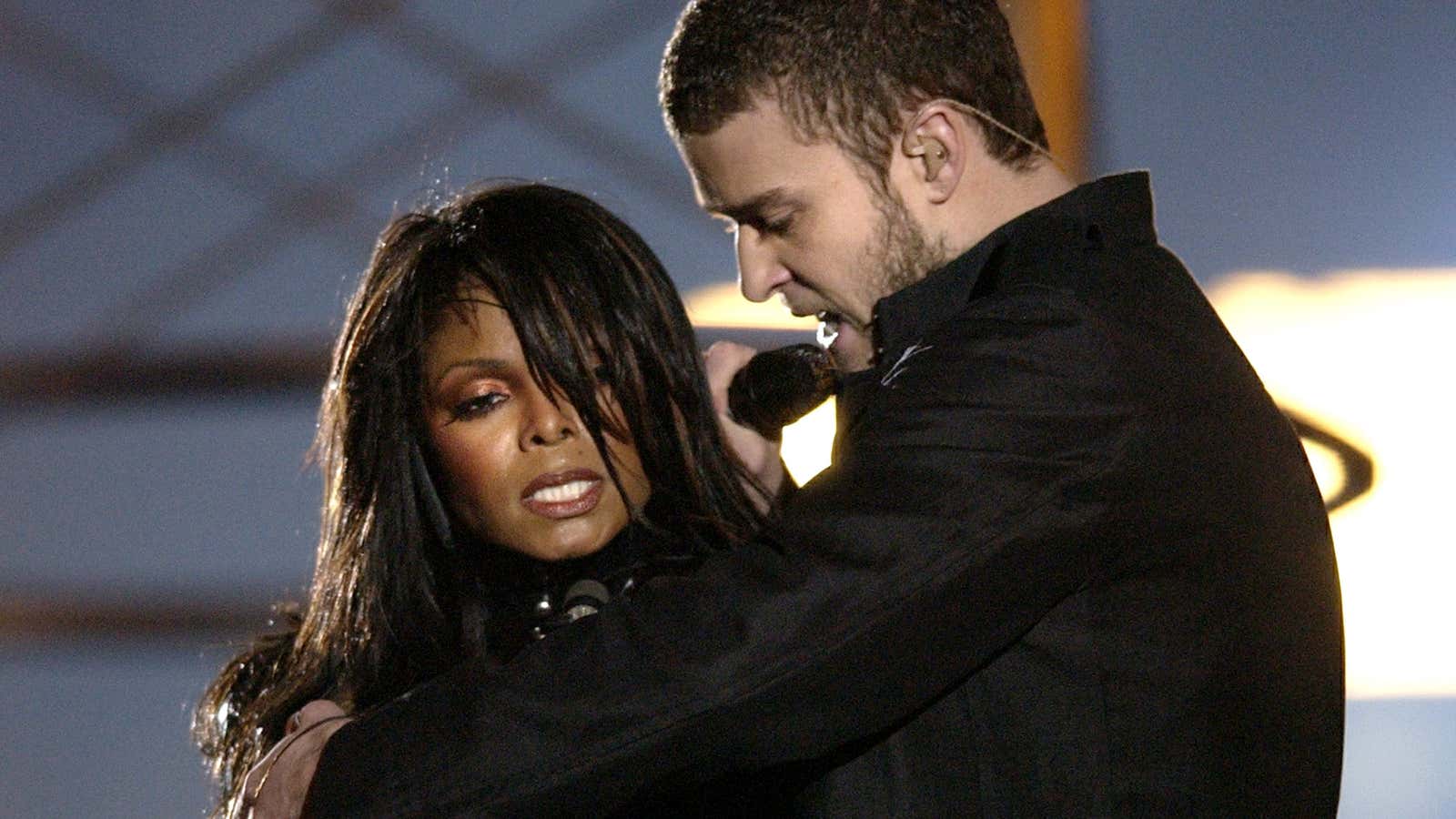Many Americans watch the Super Bowl for reasons other than the game of football, and for those who couldn’t care less which team wins, the halftime show is—besides the ads—probably the event’s biggest draw. This year, the performance will star Justin Timberlake, almost surely alongside a few unannounced guests and cameos (including, it seems, a hologram of Prince).
Timberlake has performed at the Super Bowl before, twice. The first time, in 2001, was forgettable. The second, in 2004, was not—in part, because it changed the English language.
Timberlake was not the announced entertainment for the 2004 Super Bowl; that was Janet Jackson. Jackson performed a medley of songs, and then Timberlake came out on stage. Together, they performed Timberlake’s “Rock Your Body,” and as it reached its close, Timberlake grabbed a part of the bustier of Jackson’s outfit—a custom piece designed by Alexander McQueen—and pulled it off, revealing his co-star’s right breast and nipple (partially covered by a sun-shaped piece of jewelry).
In retrospect, the public and media outcry that followed feels a bit ridiculous and puritanical. If there is anything offensive about that performance, it’s the complicated racial dynamics that play out when a white man publicly undresses a black woman. But that wasn’t discussed at the time. The conversation in 2004 was entirely about Jackson and her body; the media called it “nipplegate.” Everyone involved claimed the incident was inadvertent, and in a statement released after the game, Timberlake referred to it as a “wardrobe malfunction.”
That phrase sounds so familiar in 2018 that it’s hard to remember that it didn’t exist before Janet and Justin.
According to records kept by LexisNexis—which archives thousands of news sources from around the world—there is literally one US media use of phrase “wardrobe malfunction” before 2004. Strangely, it happened to be in 2003, on the cable-news show CNN Daybreak. Host Carol Costello is discussing the new “top TV phrases” of the year with meteorologist Chad Myers:
COSTELLO: “Mess O Potamia.” That’s from “The Daily Show with Jon Stewart,” as he’s referring to the situation in Iraq.
MYERS: I always watch that show one day late. It comes on at 7:00 on Comedy Central.
COSTELLO: Me too. Me too. It’s very funny. “Girlie men.”
MYERS: “Wardrobe malfunction.”
COSTELLO: Yes, we all know (UNINTELLIGIBLE) whatever.
MYERS: Yes.
It’s impossible to tell from the transcript what they could have been talking about.
Usage of the phrase exploded after the Super Bowl, and hasn’t gone away since. Today, “wardrobe malfunction” is in the Oxford, MacMillan, and Collins dictionaries, among others, and usage seems to be on the rise.
In 2012, it was even employed by the chief justice of the US Supreme Court. The Federal Communications Commission had attempted to sue CBS, the broadcaster of the 2004 Super Bowl, for indecency. The case went all the way to the Supreme Court, which said that, at that time, there were no laws on the book that justified the suit. But the FCC did change their regulations afterwards, which chief justice John Roberts noted in the court’s ruling: “It is now clear that the brevity of an indecent broadcast—be it word or image—cannot immunize it from FCC censure. Any future ‘wardrobe malfunctions’ will not be protected on the ground relied on by the court below.”
